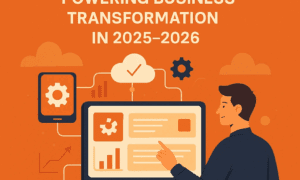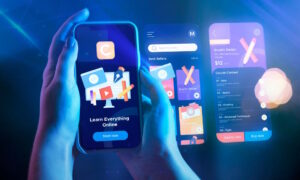In an era marked by rapid technological advancement, the realm of education has undergone a profound revolution, thanks to the rise of mobile learning. With the global pandemic acting as a catalyst for change, the adoption of mobile learning has become more than just a trend—it has become a necessity. This blog will explore the journey of mobile learning, its integration with custom app development, and the potential it holds for the future of education.
What is Mobile Learning?
Mobile learning, often referred to as m-learning, is an innovative approach to education that leverages mobile devices such as smartphones and tablets to deliver learning content. It offers the flexibility to access educational materials and resources anytime, anywhere, breaking down the barriers of traditional classroom learning. This dynamic method fosters engagement, interactivity, and individualized learning experiences, catering to a diverse range of learners.
The Rise of Mobile Learning
The ascent of mobile learning can be attributed to the increasing ubiquity of smartphones and the transformative power they wield. According to Statista, the global number of smartphone users reached a staggering 4.5 billion in 2020 and is projected to rise further. This surge in smartphone usage has paved the way for mobile learning to transcend the boundaries of conventional education, making knowledge dissemination more accessible and convenient.
Pandemic-Driven Transformation: A Compelling Shift
The outbreak of the COVID-19 pandemic marked a turning point in the history of education. The closure of physical schools and institutions compelled educators and learners to pivot towards online and mobile learning. Educational institutions worldwide had to swiftly adapt to digital platforms to ensure continuous learning. As a result, the pandemic acted as a catalyst, propelling mobile learning to the forefront of education. According to UNESCO, the pandemic led to the closure of schools for over 1.6 billion students worldwide, highlighting the urgent need for innovative learning solutions.
Empowering Learning through Custom App Development
The synergy between mobile learning and custom app development has been instrumental in shaping modern education. Custom app development empowers educational institutions and developers to create tailored learning experiences that cater to the unique needs of learners. Let’s delve into some of the key features that custom app development brings to the realm of mobile learning:
- Adaptive Learning Algorithms: Custom-built apps integrate adaptive algorithms that analyze learner progress and behavior. These algorithms dynamically adjust the learning journey, offering personalized content and assessments. Duolingo, a language learning app, exemplifies this by identifying and addressing areas of difficulty to enhance the learning experience.
- Enhanced Engagement: Gamification elements, interactive quizzes, and multimedia-rich lessons foster heightened engagement and motivation. A study by eLearning Industry reveals that gamified learning apps can lead to a remarkable 14% higher skill-based knowledge retention rate, compared to traditional methods.
- Seamless Accessibility: Mobile apps erase geographical boundaries, ensuring education is accessible to all. Learners, irrespective of their location, can access a wealth of resources and lessons at their fingertips, democratizing education like never before.
The Future of Mobile Learning
The future of education lies intertwined with the potential of mobile learning. As technology continues to advance, the possibilities for education are boundless. Custom app development is set to further enhance learning experiences through innovative features such as augmented reality (AR) and virtual reality (VR), offering immersive and interactive lessons. Additionally, the integration of artificial intelligence (AI) will facilitate more sophisticated adaptive learning, providing students with even more personalized and efficient learning paths.
Furthermore, the future holds promise for collaborative learning through mobile apps, allowing students to engage in group projects, discussions, and knowledge-sharing regardless of their physical locations. As 5G technology becomes more prevalent, the speed and reliability of mobile networks will further enrich the mobile learning experience, enabling seamless streaming of high-quality educational content.
Conclusion
Mobile learning, fueled by custom app development, is ushering in a new era of education characterized by accessibility, engagement, and personalization. From its humble beginnings to its pivotal role during the pandemic, mobile learning has proven its significance in transforming traditional educational paradigms. As we look ahead, the fusion of technology and education will continue to shape the landscape of learning, empowering individuals worldwide with the tools they need to thrive in a rapidly evolving world. The journey is far from over, and the future of mobile learning is undoubtedly bright.



































